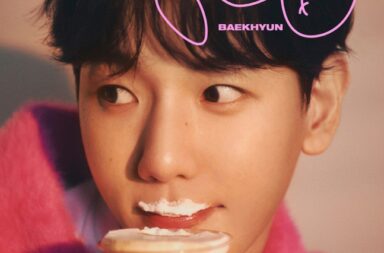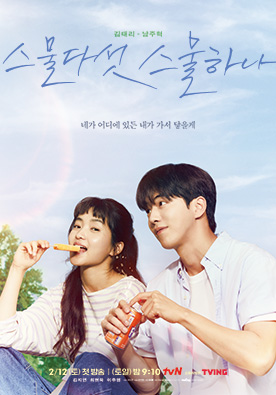
“I miss the things I used to worry about,” says a 22 year-old Back Yi-jin (Nam Joo-hyuk), to an 18 year-old Na Hee-do (Kim Tae-ri).
As far as relatable lines go, it’s hard to think of one from any recent drama that hits the nail on the head as hard as this one — especially for one that doesn’t even wholly take place in the 21st century.
Rather, while Twenty-Five Twenty-One surprisingly opens on a current COVID-19 world, it quickly takes viewers back to the late 1990s for a nostalgic trip down memory lane to authentically and critically explore what it means for young people to come of age and grapple with the unexpected conundrums of both youth and adulthood, and achieve greatness, all the while living through not the easiest of times.
This review contains spoilers.
Seemingly unlike her mother’s athletic destiny, Na Hee-do’s now-daughter, Min-chae (Choi Myung-bin) has just quit ballet, and run away to her grandmother’s house, where she discovers Hee-do’s diary from her fencing days and late teenage years. She dives into the journal for a look into her mother’s unique and inspiring journey as a young, hardworking athlete and aspiring fencer. Soon enough, we’re instantly transported to 1998, the year following the 1997 Asian Financial Crisis, to learn how Hee-do came to achieve her fencing dreams and meet a few special people along the way.
As the story of Twenty-Five Twenty-One unfolds, Hee-do must face reality. Her school’s fencing program is cut due to the impacts of the financial crisis, and her mom (Shin Jae-kyung), an anchor for the 9 o’clock news in Seoul, doesn’t seem to be her biggest cheerleader. Instead of letting real world matters get her down, Hee-do seizes the opportunity to maneuver her way into the same school and the same team as her idol and Korea’s star gold medal fencer, Ko Yu-rim (Bona of WJSN).
Along the way, she also meets Back Yi-jin, who is also facing a harsh reality of his own. After his family goes bankrupt due to the financial crisis, he’s forced to drop out of his prestigious college, move out on his own into a room in Hee-do’s and Yu-rim’s classmate’s house, deal with his father’s debtees who continuously harass him, and take various parttime jobs around town until he finds a stable full-time job as a reporter coincidentally at the same station Hee-do’s mother works at. As Yi-jin and Hee-do continue to cross paths around the neighborhood, often in the bookstore Yi-jin briefly works at as Hee-do pines for the latest copy of the manhwa Full House, they quickly become each other’s biggest cheerleaders during their trying times.
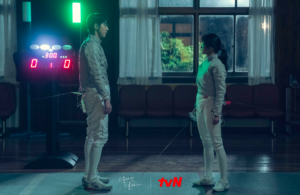
While there’s a palpable fondness and brewing sense of romance between the two characters, who are four years apart in age, they still keep each other at arm’s length when they’re 18 and 22, respectively. Presumably, the name of the show refers to the ages of Yi-jin and Hee-do when they finally get together — 25 and 21. To that end, in the first half of the series, Twenty-Five Twenty-One still uses typical romance drama tropes in order to build the romantic tension between the two. However, it doesn’t focus on these romantic tropes too closely, as that’s not meant to be the nature of their relationship at this point in time anyway. For example, when Yi-jin pulls Hee-do out of the street to save her from being hit by a passing car, it’s not at all the focal point within the episode or greater plot. If anything, these scenes come at just the right time within each episode as a bonus, heartwarming touch of endearment. They signal that there’s something there, but what that “something” may be is still very much unknown.
These tropey moments aren’t where the substance of their friendship, nor the drama as a whole, lie anyway. Hee-do’s and Yi-jin’s bond isn’t built purely off of an arm grab or an intense stare while Yi-jin dabs a spot of ice cream off of Hee-do’s face. Rather, it comes through in their dialogue and therefore the show’s writing, which is one of its strongest points. Namely, while they’re both going through their own roadblocks and struggles, they’re there for each other to support one another and provide words of wisdom during times of need, from both a more youthful point of view (Hee-do’s) and from a more “mature,” adult point of view (Yi-jin’s).
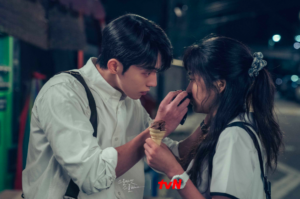
For example, early on in their friendship, Hee-do tells Yi-jin that whenever they’re together, they should always find moments of happiness. For Yi-jin, who puts the burden of his family’s debt almost wholly on himself and oftentimes fails to look at things on the bright side, these words of wisdom from the younger, presumably less mature Hee-do are exactly what he needs to move forward in his life and find his own individual sense of purpose and joy. Later, when Hee-do is preparing to try out for the national fencing team, Yi-jin makes it clear back to Hee-do how much her optimism and inspiring strong-willed nature has rubbed off on him:
Everyone wants to be as strong-minded as you. They don’t want to be scared of losing and failing. Sometimes I wish I could take it from you. I think that explains why I miss you when I feel mentally weak.
Conversely, Yi-jin also gives Hee-do words of wisdom of his own that feel realistic and authentic within the show’s greater narrative and that are universally applicable to life in general. When he tells her he “[misses] the things he used to worry about,” he’s reminding her that adulthood comes with its own obstacles too, and not to waste her youth away just to be viewed as an adult in the eyes of others sooner. Adulthood comes with its positives, but it also comes with a lot of negative weight, including the burden Yi-jin is currently stuck facing.
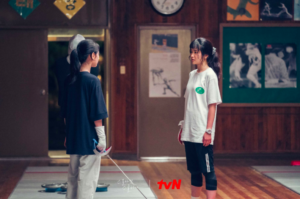
On top of that, Twenty-Five Twenty-One’s authenticity in its writing and dialogue also bleeds into the rest of the plot and the overall atmosphere it gives off. The plot itself feels realistic in the sense that the problems each character encounters, in their own lives and with each other, are realistic, especially given the setting and time period the drama takes place in. Nothing works out or falls into place perfectly without reason, as is sometimes the case in other dramas. For example, Yu-rim, whose family is also in a tight spot financially, loses her sponsor at a critical moment in the show’s narrative. Yi-jin fails job interview after job interview, finally landing his journalist gig after a significant amount of time passes by. And Hee-do wins her first gold medal off of a contested referee call, which dampens the value of her success and months, if not years, of hard work.
For this reason, when things go awry, it’s easy to feel and empathize with the characters’ frustrations and emotions. Their words, expressions, and reactions are entirely relatable, making their experiences all the more authentic and universal-feeling. It also doesn’t go unseen that the writers take care in telling and treating each lead character’s respective story with largely the same degree of depth. While it’s clear that Hee-do is the protagonist of this story, Yi-jin and Yu-rim have their own backstories that have made them into the people they are presently when the narrative takes place, and the writers don’t ignore their histories. If anything, they use it to tell an even more well-rounded, all-encompassing story.
The authentic nature of the plot and writing also transcends into each actor’s presence on screen. Kim Tae-ri particularly steals the show with every scene she’s in, often utilizing physical comedy to display Hee-do’s buoyant, youthful energy and and convince the audience to root for her success. As a 31 year-old, Kim Tae-ri’s ability to physically and emotionally capture the essence of an 18 year-old girl is astonishing. On top of that, when she conveys Hee-do’s serious, strong-willed side, she also captures the character’s love and passion for fencing so palpably it’s nearly impossible not to feel her emotions when she feels them too. Nam Joo-hyuk also shows growth in his acting in his role as Yi-jin, showing a wider and more nuanced range of emotions that adds to the realism of the drama.
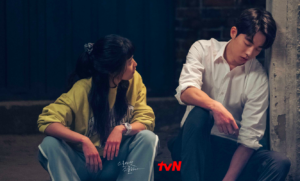
To top it all off, Twenty-Five Twenty One‘s portrayal of a late ’90s-era Seoul so far is entirely convincing, and easy to get lost in, thanks to a plethora of props and retro elements that so seamlessly blend into the show’s narrative, along with the characters’ hairstyles and costumes. Characters use pay phones, landlines, pagers, and clunky, boxy desktop computers to communicate with one another; at times their usage (or lack thereof) become points of contention or conflict in smaller side narratives. While the incorporation of the desktop computers and instant messaging mode of communication into a sub-plot line in which Hee-do unknowingly communicates her thoughts and feelings to a mysterious “Injeolmi,” who turns out to be Yu-rim, feels a little obvious, the visuals of these elements provide that instant nostalgia factor that adds to Twenty-Five Twenty-One‘s atmosphere of comfort.
With everything Twenty Five, Twenty One has shown so far — authenticity, relatability, and a welcome sense of nostalgia — it’s poised to become a classic comfort show that current and future audiences will turn back to for years to come. The drama puts its all into capturing the crux of dreams, youth, and the cloudy future of adulthood in a meaningful way that never feels contrived. It takes these themes seriously, while lightening the mood with a retro, wistful setting that conjures up the feeling of youthful, summery nights. While there are a few drawbacks to the show, namely its lengthy episodes and jam-packed plot lines, each of its well-done elements, including relatable writing, a mostly realistic plot, stellar acting from its cast, plus a largely accurate and reassuring portrayal of a now bygone era, set it up promisingly for a potentially long-lasting legacy.
(YouTube. Images via tvN.)

